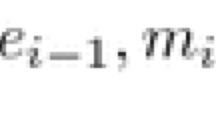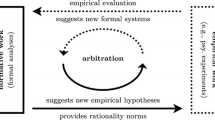Abstract
The impossibility results of Bovens and Hartmann (2003, Bayesian epistemology. Oxford: Clarendon Press) and Olsson (2005, Against coherence: Truth, probability and justification. Oxford: Oxford University Press.) show that the link between coherence and probability is not as strong as some have supposed. This paper is an attempt to bring out a way in which coherence reasoning nevertheless can be justified, based on the idea that, even if it does not provide an infallible guide to probability, it can give us an indication thereof. It is further shown that this actually is the case, for several of the coherence measures discussed in the literature so far. We also discuss how this affects the possibility to use coherence as a means of epistemic justification.
Similar content being viewed by others
References
Bovens L., Hartmann S. (2003). Bayesian epistemology. Oxford, Clarendon Press
Dempster A.P. (1968). A generalization of Bayesian inference. Journal of the Royal Statistical Society, 30, 205–247
Fitelson B. (2003). A probabilistic theory of coherence. Analysis, 63, 194–199
Fitelson B. (2004). Probabilistic coherence form a logical point of view. Presentation at a Bayesian Epistemology Workshop at the London School of Economics. Available from Fitelson’s webpage at http://fitelson.org/research.htm
Halmos P.R. (1950). Measure theory. Princeton, van Nostrand Company Inc
Kyburg H.E. (1974). The logical foundations of statistical inference. Dordrecht The Netherlands, D. Reidel Publishing Company
Levi I. (1986). Hard choices: Decision making under unresolved conflict. Cambridge, Cambridge University Press
Matsumoto M., Nishimura T. (1998). Mersenne twister: A 623-dimensionally equidistributed uniform pseudorandom number generator. ACM Transactions on Modeling and Computer Simulation, 8, 3–30
Meijs W. (2005). Probabilistic measures of coherence. Doctoral dissertation at the University of Rotterdam.
Olsson E.J. (2002). What is the problem of coherence and truth?. Journal of Philosophy, 99, 246–272
Olsson E.J. (2005). Against coherence: Truth, probability and justification. Oxford, Oxford University Press
Rescher N. (1962). Plurality-quantification. The Journal of Symbolic Logic, 27, 373–374
Rogers C.A. (1970). Hausdorff measures. Cambridge, Cambridge University Press
Schlechta K. (1997). Nonmonotonic logics: Basic concepts, results, and techniques. Berlin, Springer
Shafer G. (1976). A mathematical theory of evidence. Princeton, Princeton University Press
Shogenji T. (1999). Is coherence truth-conducive?. Analysis, 59, 338–345
Author information
Authors and Affiliations
Corresponding author
Rights and permissions
About this article
Cite this article
Angere, S. The defeasible nature of coherentist justification. Synthese 157, 321–335 (2007). https://doi.org/10.1007/s11229-006-9058-4
Published:
Issue Date:
DOI: https://doi.org/10.1007/s11229-006-9058-4




